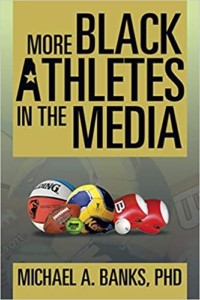Title: More Black Athletes in the Media
Author: Michael A. Banks, PHD
Publisher: Xlibris
ISBN: 978-1-4931-6937-5
Genre: Sports/History
Pages: 320
Interviewed by: Ella Vincent
Author Interview with Michael A. Banks, PHD
Today we are talking to Michael A. Banks, PHD from the title “More Black Athletes in the Media.”
PBR: More Black Athletes in the Media is so timely in this era of anti-racist activism. How do you think this book can be instructional to readers about the bias Black athletes faced?
I share patterns of media characterizations of black athletes throughout the 20th Century, according to the sociological framework of my original dissertation of 1993, “Black Athletes in the Media”. This book is an edited copy and a demonstration of the continuation of this practice. I chose select articles from select sporting events that I believed that this practice would be emphasized (e.g. the Holmes/ Cooney fight of 1982, Magic vs. Bird, NCAA championship, 1980, etc.). The practice can be observed present day, although in more subtle/ camouflaged forms (such as the demonization of Colin Kaepernick).
PBR: Muhammad Ali, John Carlos, and Tommie Smith were criticized for being so outspoken about Black Pride in the 1960’s, but are celebrated now. Does that mean there is progress being made in the treatment of Black athletes in the media?
Muhammad Ali, John Carlos and Tommie Smith were persecuted for their so-called anti-American black stands, as Kaepernick is today. First Amendment rights notwithstanding, these men, among others like MLK, were persecuted and hated for their views. Strange that men such as these are heralded later in life as true heroes. They are heroes for defying a broken system. What’s also strange is the system is still broken, despite their efforts.
PBR: Your book is so well-researched with articles from the past. Why do you feel it was necessary to publish the articles about Black athletes with the explicitly racist language?
I was an obsessed young fan of Cassius Clay, age 8 (1963). When he became Muhammad Ali (1964), I became even more obsessed with this amazing champion. It was at that time that the media became enraged with his new religion and I couldn’t understand why. I was personally offended because Ali was my hero. Not only that, I felt what they were saying was wrong. As the years went by, I witnessed his further persecution by the Government itself, and I also saw him regain his championship in 1974, which I looked at as an American showdown in Africa. I never witnessed a greater event, sport or otherwise. The results of the fight emanated not just victory, but a sense of justice for Ali, only the justice took place in Africa.
My choice of articles contains variations of racial characterizations throughout the 20th Century, beginning with the first black heavyweight champion, Jack Johnson. Johnson became a hated American figure for defeating the first “white hope”, Jim Jeffries, in 1910. The impact was devastating to white Americans who inherently believed in Caucasian supremacy, and the various media reactions to that event reflect the social mood at the time. Johnson was eventually run out of the country. Fascinating how times changed when the second black heavyweight champion, Joe Louis, defeated Max Schmeling in NY, and was received by an American media audience with total approval.
PBR: What do you say to readers who may say you’re being too sensitive about race or race shouldn’t be a factor in sports?
Professional athletes are sometimes forced to take a political stand. If they are black, their posture becomes twofold. Race shouldn’t be a factor in sports, but in America, skin color has become part of the uniform, especially in professional sports. Today’s black athletes may not face the same circumstances of the past in the same form (black vs. white), but may get caught up in the politicization of certain incidents, victimized, and/ or labeled anti-American. Trump referred to NFL players who kneel before the flag with respect to black lives as “sob’s”. The evidence for the evolution of media characterizations continues to take place in current sporting news .
PBR: What gives you hope about the treatment of Black athletes in the media?
I would hope that emphasis is placed on performance, rather than political affiliation, in sports. What a person believes or states should not be his epitaph at the end of his career. As Americans, we should be more tolerant of individuals from different backgrounds, races, religions, etc., but that should not define performance.
PBR: What do you want readers to gain from More Black Athletes in the Media?
“More Black Athletes in the Media” was written as a documented media study of a subject that I was personally interested in. It is a documentary of American history, as basically seen through the newspapers of the 20th Century, as well as radio and television. If the reader is historically inclined, he/ she will enjoy this reading. What I would like the reader to gain is an alternate historical perspective of the American experience.


